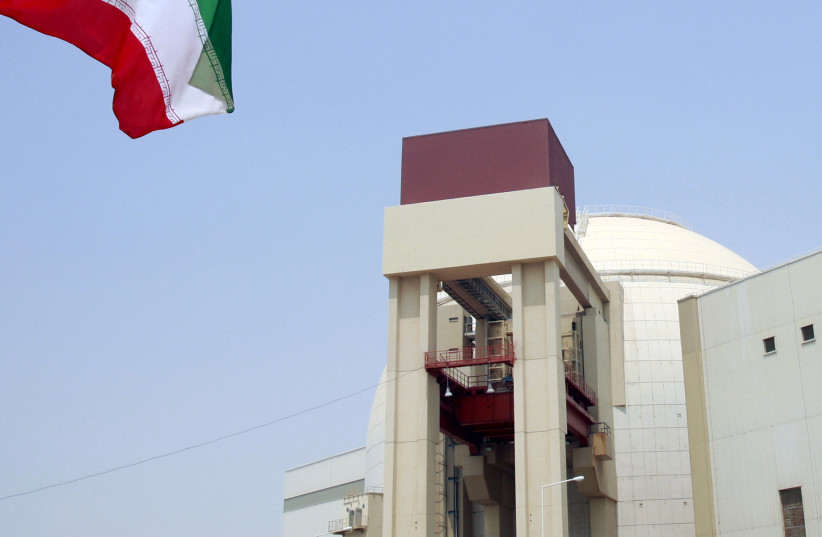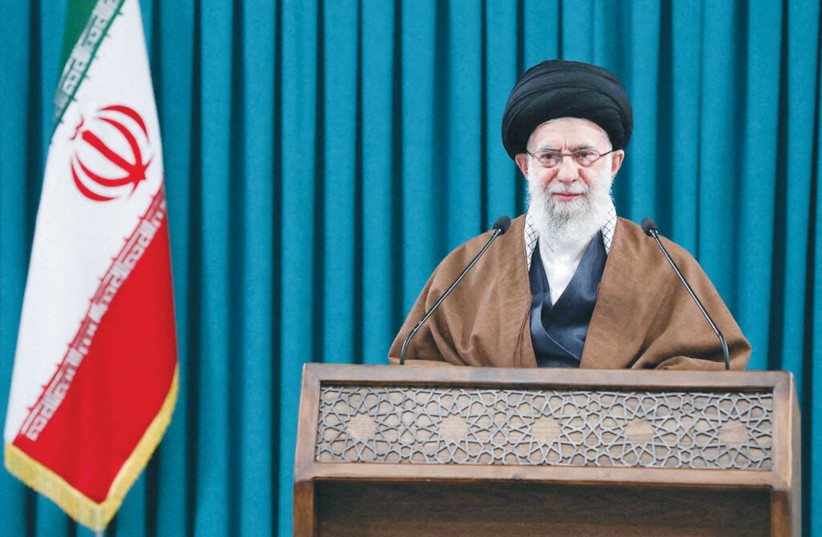If Tehran took this step, it would force Israel to make a new unprecedented kind of choice.

So both Iran and the US thought there would be a return to the JCPOA 2015 nuclear deal sometime between early February and early March when the IAEA quarterly meeting was held.
Now that this did not happen, several more weeks have gone by and there is no new obvious way to set a deadline before the next big IAEA meeting in June, will the Islamic Republic finally weaponize its uranium?
If Tehran took this step, it would force Israel to make a new unprecedented kind of choice.
Would Jerusalem finally order a high-stakes preemptive strike on Iran’s nuclear facilities to prevent the ayatollahs from having the possibility of fielding a functional nuclear weapon?
Or would Prime Minister Naftali Bennett rely on Israeli intelligence to thwart and follow the progress of Iran Supreme Leader Ayatollah Ali Khamenei’s clandestine weapons group, hoping there would be a later opportunity to thwart the firing of a nuclear missile – even if this meant an increased risk of Iran crossing the threshold in secret?

Some of this decision is gaging which risk is worse: the blowback from attacking Iran or the dangers of inaction.
But the controversy goes back to a dispute within the defense establishment about whether a preemptive strike to stop Iran’s nuclear program would need to be launched to be effective.
Some say a strike needed to happen 10 years ago before Iran had operating underground facilities.
Some say it could still be effective before or immediately after Iran enriches its uranium to the weapons level of 90%?
Finally, some say it could still be effective six months to two years after uranium weaponization.
The six months to two years dispute is rooted in different guesses about how long it would take Iran to master detonation, miniaturization and delivery of a nuclear warhead on a missile – all of which are separate tasks from uranium enrichment.
However, weapons testing issues are much easier to hide in smaller facilities. This is why the focus has always been on not letting the Islamic Republic get to the 90% level in the first place.
So that is the dilemma that Israel would face.
But will Khamenei roll the dice and cross the 90% threshold or will he see that as too risky, not wanting to see what Bennett would decide?
To date, there is evidence to argue both ways.
But the majority of the evidence is that Khamenei will not jump to 90% and is still fishing for a return to the JCPOA, but feeling out if there are any more concessions he can peel out of the US.
First, the most effective time to have jumped to weaponized uranium, if he wanted to pressure the West into more concessions, would have been in early March.
This would have been right after the IAEA Board of Governors got cold feet and failed to condemn Iran despite having threatened to do so if there was still no deal.
Apparently, Khamenei himself got cold feet about going to the mat and his representatives have continued to send positive messages about hoping for a deal.
Also, Khamenei has taken many other actions to pressure the West which, while provocative, were much less provocative than weaponizing uranium.
These include in mid-March, converting some of the 60% uranium hexafluoride into a form closer to the weaponized state and harder to dispose of if there is a deal, but in tiny amounts and still far short of weaponizing it.
In addition, Tehran launched attempted drone strikes on Israel and has engaged in an escalating mixed physical and cyber conflict with Jerusalem in recent weeks and months.
In recent days, Iran’s Houthi proxies in Yemen also launched multiple drone attacks on Saudi Arabia.
All of these measures are in line with Khamenei trying to blackmail the West into more concessions. But the fact that Iran tried to blackmail the West, but did so in weaker ways than weaponizing uranium, shows Khamenei is still being cautious. He is still worried about going too far in Bennett’s eyes.
On the flip side, Iran was supposed to send the IAEA updated answers about the past military dimensions of its nuclear program by March 20 after a hard-negotiated deal between the sides.
The Islamic Republic broke the deal, produced nothing and there is no sign that it will restore normal inspections with the IAEA if the JCPOA is not restored.
This means Khamenei is preserving an off-ramp where he drops the JCPOA negotiations and moves in a more confrontational manner.
But what is most likely from US and Iranian official statements over the weekend is that the sides are doing final negotiations about the status of the Islamic Revolutionary Guard Corps (IRGC).
US negotiator Rob Malley on Sunday said even if the IRGC is dropped from the terrorists list, that non-nuclear sanctions will still remain.
In diplomatic speak, this was the clearest sign yet that the US is ready to drop the IRGC from the terror list.
Meanwhile, Iranian Foreign Minister Hossein Amir-Abdollahian said that an IRGC official told him that taking the group off of the terror list should not hold up the deal, then added paradoxically that he would still press for removal from the list.
All of this suggests that the IRGC will be removed from the list, but that the sides are negotiating over what guarantees Khamenei will give the US in return about refraining from attacking Americans and possibly turning down the heat in the Yemen conflict.
So at this moment, it appears Khamenei still wants a deal over jumping to weaponizing his uranium.
Yet, the dynamics are fluid and Israel will need to be on its guard more than ever the longer Iran remains at the 60% enrichment level with no new deal imminent.
Content retrieved from: https://www.jpost.com/middle-east/iran-news/article-702481.